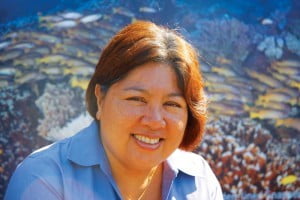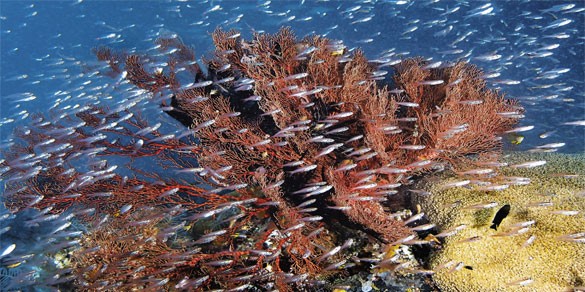The biggest and most important coral reefs in the world are found in an area of tropical marine waters called the Coral Triangle. This area hosts no less than 76% of the world’s coral species, six of the world’s seven marine turtle species, and over 2,000 reef fish species. The roughly triangular area encompasses the marine waters of six countries: Malaysia, Papua New Guinea, Philippines, Solomon Islands, Timor Leste and Indonesia. As the rapidly increasing human impact is threatening this unique marine environment, the Coral Triangle Centre in Sanur on Bali fights for its conservation.
The Coral Triangle is dubbed the Amazon of the Sea by many conservationists. And that’s no joke: it is the global centre of marine biodiversity. Overall, it comprises 53 percent of the world’s coral reefs and boasts an abundant variety of sea life. It is also the food source of over 120 million people in the six countries. But there are problems. The socio-economic situation of people living in and around in the Triangle is facing serious threat due to destructive fishing. Moreover, it is predicted that climate change is one of the factors that pose risk and challenges for the area and thus for the people living there. For these reasons, conservation of the Coral Triangle is considered a top priority by WWF since 2007.
One and a half years ago, Rili Djohani set out on a mission when she established the Coral Triangle Centre (CTC) in Sanur. She had worked in conservation since the early nineties. First, she helped set up some of the first marine conservation projects in Indonesia for the World Wide Fund for Nature (WWF). Later, she started working for the Nature Conservancy on the Coral Triangle Center program. Working with such big and well-known organizations has a lot of advantages. But over the years, Rili started realizing that fighting for conservation needed a focus on working at a local level.
Now she heads a small group of passionate people fighting for conservation of the worlds most important marine area. As the Coral Triangle Center (CTC) began in 2000 as a program of The Nature Conservancy, the aim was to strengthen the capacity of local communities and governments to create so called marine protected areas and promote sustainable use of these areas. Working locally however, made it a lot easier to listen to and work together with people on a community level. So Rili Djohani decided to establish CTC as an independent Foundation in late 2010.
And so far, they’ve been doing great. One important part of the work is enhancing the capacity of local communities to effectively care for the marine ecosystem. This is done through training and educational programs. Also, CTC has developed long-term partnerships with (local) governments and corporations to make policies that intend to minimize human impacts on marine environments. This means Rili Djohani will find herself in a meeting with local fishermen one day, and meeting with the Ministry of Marine Affairs and Fisheries the next.
Social and sometimes even informal meetings like these certainly are some of the exciting aspects of her work. But there are also challenges ahead. With an already extensive network, the CTC has recently seen a rise in the number of programs and people involved. Their biggest challenge will be to keep their focus on working on the local level. One way of doing that is running very intensive projects in which there is face to face communication with all people involved and important information is shared. That involves a lot of determination of Rili and her team.
Since founding the CTC they have been doing exactly that: giving all they can for the conservation of the Coral Triangle. And I am sure they will continue to do so in the future. They are passionate about their work, but it’s also necessity that drives them. With the human impact on marine ecosystems rapidly increasing, there is still a lot of work to do for the conservation of this unique and hugely important area for today and future generations. And really, the time to do that is now, because if the Amazon of the Seas would disappear, it will never again come back.
If you want to know more about the work of the Coral Triangle Centre, check out their website: http://www.coraltrianglecenter.org.




